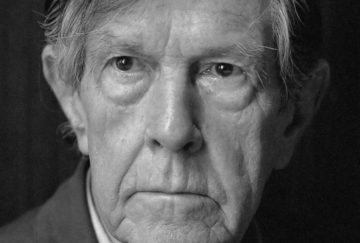Dmitri Tymoczko in the Boston Review:
 Milton Babbitt and John Cage, two of the most notorious postwar American composers, are often thought to be antipodal figures. Babbitt is straight, Jewish, politically conservative, and southern, a skeptical rationalist who talks like a mathematician on speed. Cage–who died in 1992–was gay, goyish, politically left, and Californian, a genial fruitcake whose enthusiasms ran toward astrology, mushrooms, Zen, and anarchist politics. Babbitt’s music is fastidiously organized, each of his notes carefully placed within multiple nested rhythmic and melodic patterns. Cage’s music, by contrast, is scrupulously disorganized, composed randomly–for instance by tossing coins or tracing astronomical maps onto music paper. Not surprisingly, Babbitt is an academic, and has many students who teach at music departments throughout the country. Cage, who never graduated from college, was an auto-didact (more or less), and has had at least as much influence on visual arts and popular music as on the world of academic musical composition.
Milton Babbitt and John Cage, two of the most notorious postwar American composers, are often thought to be antipodal figures. Babbitt is straight, Jewish, politically conservative, and southern, a skeptical rationalist who talks like a mathematician on speed. Cage–who died in 1992–was gay, goyish, politically left, and Californian, a genial fruitcake whose enthusiasms ran toward astrology, mushrooms, Zen, and anarchist politics. Babbitt’s music is fastidiously organized, each of his notes carefully placed within multiple nested rhythmic and melodic patterns. Cage’s music, by contrast, is scrupulously disorganized, composed randomly–for instance by tossing coins or tracing astronomical maps onto music paper. Not surprisingly, Babbitt is an academic, and has many students who teach at music departments throughout the country. Cage, who never graduated from college, was an auto-didact (more or less), and has had at least as much influence on visual arts and popular music as on the world of academic musical composition.
Yet behind these differences there lurks a fascinating, and more fundamental similarity. Leave aside the fact that even expert listeners sometimes have difficulty distinguishing Babbitt’s sophisticated musical puzzles from Cage’s mystical soundscapes. The important point is that Babbitt and Cage straddle the line between philosophy and art.
More here.
